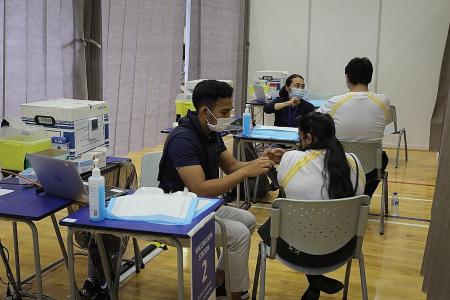Avoid strenuous activity for a week after both Covid jabs
Authorities urge extra caution as MOH probes case of teen hit with cardiac arrest a week after vaccination
All vaccinated people, especially adolescents and men below 30 years old, should avoid any exercise or strenuous physical activity for one week after their first or second mRNA Covid-19 dose, the health authorities said yesterday.
During this time, they should seek medical attention promptly if they develop chest pain, shortness of breath or abnormal heartbeats, the expert committee on Covid-19 vaccination said in a press release.
All doctors should pay particular attention to patients showing such signs and symptoms after vaccination, it added.
The expert committee had initially recommended refraining from strenuous physical activity for a week after the second dose of the mRNA vaccine.
The Ministry of Health (MOH) said the latest review took place independently of a recent incident involving a 16-year-old Singaporean boy who suffered a cardiac arrest after a weightlifting session on Saturday - six days after taking his first Pfizer-BioNTech/Comirnaty dose.
He was treated at the emergency department at Khoo Teck Puat Hospital and transferred to National University Hospital (NUH), where he is in critical condition in the intensive care unit.
MOH noted that the student received his first dose of Pfizer-BioNTech/Comirnaty vaccine on June 27 without incident.
It said it understands that the boy trains with weights above his body weight.
"Clinical and laboratory tests are in progress to understand the underlying cause. We will also work with the medical team in NUH to determine if this might be linked to his Covid-19 vaccination," MOH said.
"This will include a thorough consideration of whether there was acute severe myocarditis... as a possible diagnosis."
The expert committee said it is now advising more caution, given emerging local and international data on the small risk of myocarditis and pericarditis observed after vaccination with mRNA Covid-19 vaccines.
Pericarditis is the inflammation of tissue surrounding the heart, while myocarditis is the inflammation of the heart muscle.
LOW INCIDENCE RATE
As of June 30, the Health Sciences Authority (HSA) received 12 reports of myocarditis and pericarditis after close to 5.5 million doses of vaccines were administered. Seven were reported in men aged below 30.
HSA said: "Although there is a small increased risk of myocarditis and pericarditis in the younger age groups, the local incidence rate remains low.
"All the cases in the younger age group responded well to treatment and recovered or were discharged well from hospital."
Parents of teenage boys The New Paper spoke to said they will be exercising caution ahead of their sons' upcoming vaccinations.
Mr Johann Soh, 43, whose sons - aged 12 and 14 - took their first vaccine dose last month, said they were told at the vaccination centre not to engage in strenuous exercise for a week after the jab.
The commercial manager said: "This affected my older son as he would play badminton regularly. But he understood why he needed to do it and rested for a week."
Mr Woon Wui Tek, 48, who works in a bank, said he will advise his 13-year-old son to follow the recommended week of no exercise , plus an extra day or two for good measure.
Dr Ling Li Min, an infectious disease physician from Rophi Clinic, said based on the latest observations, it is better to take a cautious approach after getting vaccinated.
She added: "We should look to avoid activities that would significantly increase the heart rate as this could add stress to the heart. Getting hydration and enough rest and sleep are also advisable."
Dr Leong Hoe Nam, an infectious disease specialist from the Rophi Clinic, said: "We routinely ask individuals not to exercise post-flu and that is because it can strain the heart. Similarly, the vaccine induces a mild illness, so you shouldn't exercise the heart too."
The expert committee said after extensive deliberation that it continues to recommend vaccination with mRNA Covid-19 vaccines for all eligible persons, including adolescents and younger men, as the protective benefits continue to outweigh the risks of vaccination.
It added: "Even with high vaccination rates in our population, settings with low overall levels of vaccination will continue to be susceptible to outbreaks.
"The risk of transmission and outbreak in settings such as schools or workplaces where there is close contact among individuals will likely be higher."
Get The New Paper on your phone with the free TNP app. Download from the Apple App Store or Google Play Store now


